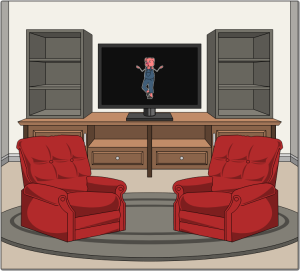5 Section 4-5: The Dative Case–Endings
4.5: The Dative Case—Endings
In exercise C in Section 4.4, you saw several different endings that you may not have seen before.
- Was schenken Sie Ihrer Mutter zum Geburtstag?
(What are you giving your mother for her birthday?)
- Was schenken Sie Ihrem Vater zum Geburtstag?
(What are you giving your father for his birthday?)
In Chapter 2, you learned that the accusative case adds an –en to masculine definite and indefinite articles to show that it is in the accusative.
Ich muss einen Computer kaufen.
(„Computer“ is masculine and therefore gets an extra -en.)
The new endings that you see above are used for the dative case. They are different from the accusative case endings.

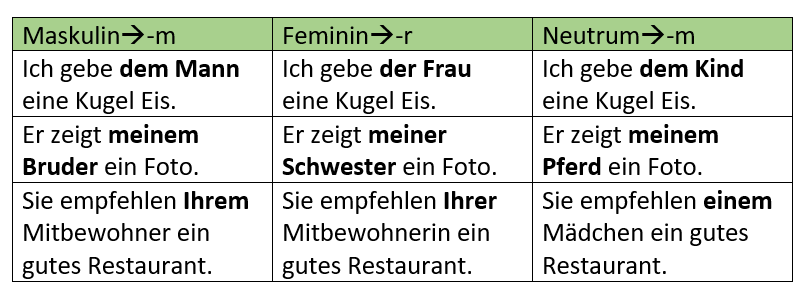
HÄUFIGE FRAGE: But in the first feminine example in the table, it shows “der Frau.” I thought “Frau” was “die.”
ANTWORT: “Frau” is indeed feminine, i.e. “die Frau.“ However, when you put it in the dative case, we add the letter -r, so in the definite article, it becomes “der Frau.”
HÄUFIGE FRAGE: But that’s weird. It looks masculine. Why?
ANTWORT: Es ist, was es ist. But it’s still feminine, regardless of how it looks.
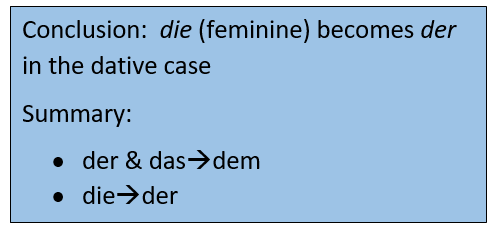

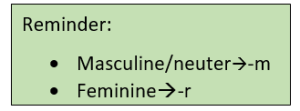
Wortstellung (word order)
As you saw in Section 4.4, German sentences typically have the following word order: subject/verb/indirect object/direct object

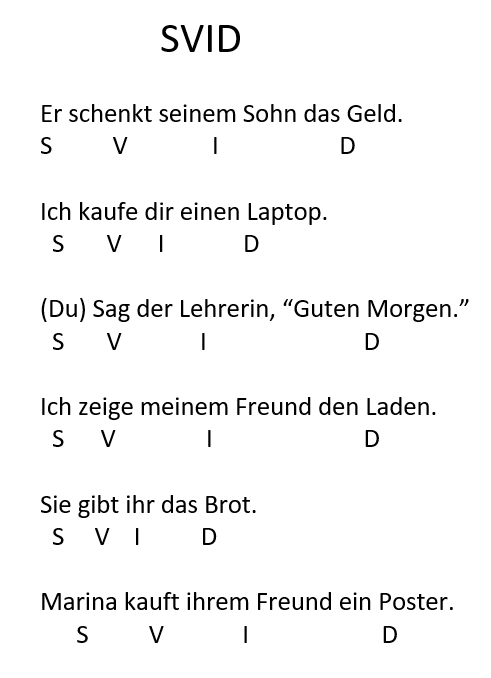 Note that in all of these examples, we are doing something FOR or TO the indirect object. Typical verbs that might end up having an indirect object are things like
Note that in all of these examples, we are doing something FOR or TO the indirect object. Typical verbs that might end up having an indirect object are things like
- geben—to give (to) Ich gebe dir 10 Euro.
- kaufen—to buy (for) Du kaufst dem Kind ein Eis.
- sagen—to say (to) Sie sagt mir oft, “Guten Morgen!”
- zeigen—to show (to) Zeig mir das Geld!
- schenken—to give as a gift (to) Er schenkt dem Hund Fleisch.
- verkaufen—to sell (to) Er verkauft uns ein Auto.
- empfehlen—to recommend (to) Sie empfiehlt mir ein Cafe.
- schicken—to send (to) Schick mir eine E-Mail.
FRAGE: But can’t I use these verbs without an indirect object too? “Ich kaufe eine neue Hose,” for example. That one doesn’t have an indirect object.
ANTWORT: Sure…but eventually, you’re probably going to have to interact with people, and you’ll need to do something for them. For example, “Ich kaufe dem Kind eine neue Hose.” This one has both an indirect and a direct object.
FRAGE: What happens if I get them mixed up?
ANTWORT: In the example above, you would end up buying the pair of pants a child→”Ich kaufe der Hose ein Kind.” (Don’t buy people!) Usually, it ends up sounding funny or makes no sense. But that’s part of learning language; you must make mistakes in order to learn. Get them out of your system now!
Ex. D: Der alte Obstkuchen. Keiner möchte den Obstkuchen. Wem sollen wir ihn schenken?
Beispiel: Vater
→Ich schenke meinem Vater den Obstkuchen.
- Cousin
- Schwager
- Nichte
- Großmutter
- Freundin
- Mitbewohner
- Chefin
- Verkäufer
- Hund
EXTRA PRACTICE: Go to Germanzone.org’s website to practice identifying indirect objects in German sentences.
https://www.germanzone.org/indirect-objects-1/
Dative Plural:
You already know that masculine and neuter add -m in the dative case and that feminine adds -r. What about plural nouns?
 Beispiele:
Beispiele:
- Wir sagen unseren Eltern, “Guten Morgen.”
- Die Frau kauft ihren Kindern ein Eis. (add extra –n to noun)
- Die Uni schickt den Studenten eine Rechnung.

Wir geben den Chefs die Zeitung.
FRAGE: But the rule says that you have to add an extra –n to the end of the noun too. In the last example, “Chefs” didn’t have an -n. Why not?
ANTWORT: For plurals that end in -s, it would be a tongue twister to say, “Chefsn,” not to mention looking awkward. -S is the exception. Fortunately, many plurals end in an –n anyway, so you won’t always have to add the final –n. See the first and third examples.

Click to see me reteaching the dative case:
Ex. E: Wem soll ich was schenken? Using the family members and pictures below, talk with a classmate about whom you’re giving what for Christmas.
Beispiel: Freunde
→Ich schenke meinen Freunden Schokolade.
(Note that Freunde, friends, is plural; we added an extra –n to the end of the noun because it was dative.)
- Geschwister
- Großeltern
- Cousins
- Eltern
- Professoren
- Mitbewohner/Mitbewohnerinnen (pl.)
- Kinder
Ex. G: Wem nochmal?
Don’t Forget About the Accusative Case!!!
By the time students learn the dative case, they often seem to forget that the accusative case is still out there and active. Many students put so much effort toward remembering the dative case, that they tend to want to put everything in the dative case—even things that shouldn’t be.
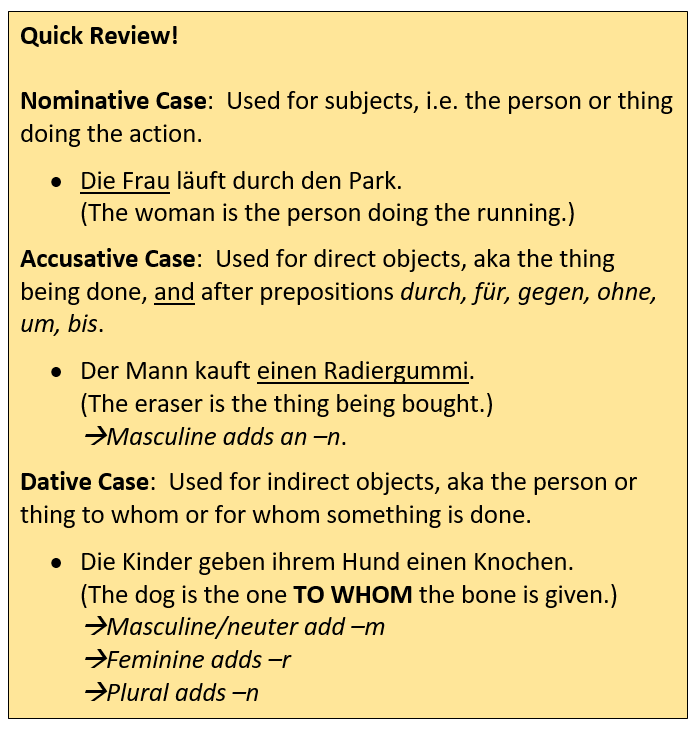
Check out Marcus Language Academy’s video for more examples:
Finally, try Claudia Kost’s and Crystal Sawatzky’s accusative/dative activity with SVID word order. (University of Alberta.) The second exercise requires you to use nominative, accusative, and dative case pronouns
EXTRA EXPLANATIONS on distinguishing cases:
- https://storylearning.com/learn/german/german-tips/german-cases-explained
- https://www.thegermanproject.com/german-lessons/nominative-accusative
EXTRA PRACTICE with nominative, accusative, and dative:
Ex. K: Nicos Weg. Episode 34: Hast du morgen Zeit? Watch episode 34 and do the online activities. You will learn how to say the date and review the months.
https://learngerman.dw.com/en/hast-du-morgen-zeit/l-37461035
Ex. L: Nicos Weg. Episode 35: Wann spielen wir? Watch episode 35 and do the online activities. You will review the modal verb können, which you learned in Chapter 3.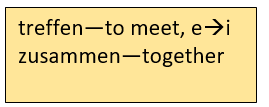
https://learngerman.dw.com/en/wann-spielen-wir/l-37468614
EXTRA PRACTICE: Go to Germanzone.org’s website to practice the dative case.
- https://www.germanzone.org/dative-case-indirect-objects-2/
- https://www.germanzone.org/dative-case-indirect-objects-4/
- https://www.germanzone.org/dative-case-indirect-objects-3/
Ex. M: Wiederholung. Was gibt es im Wohnzimmer? Was brauchen wir noch?
